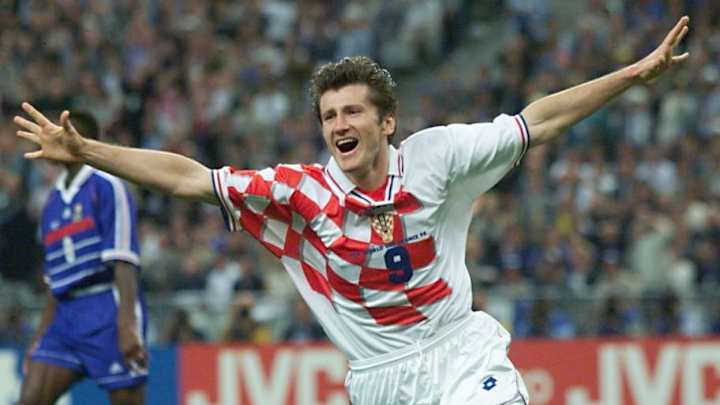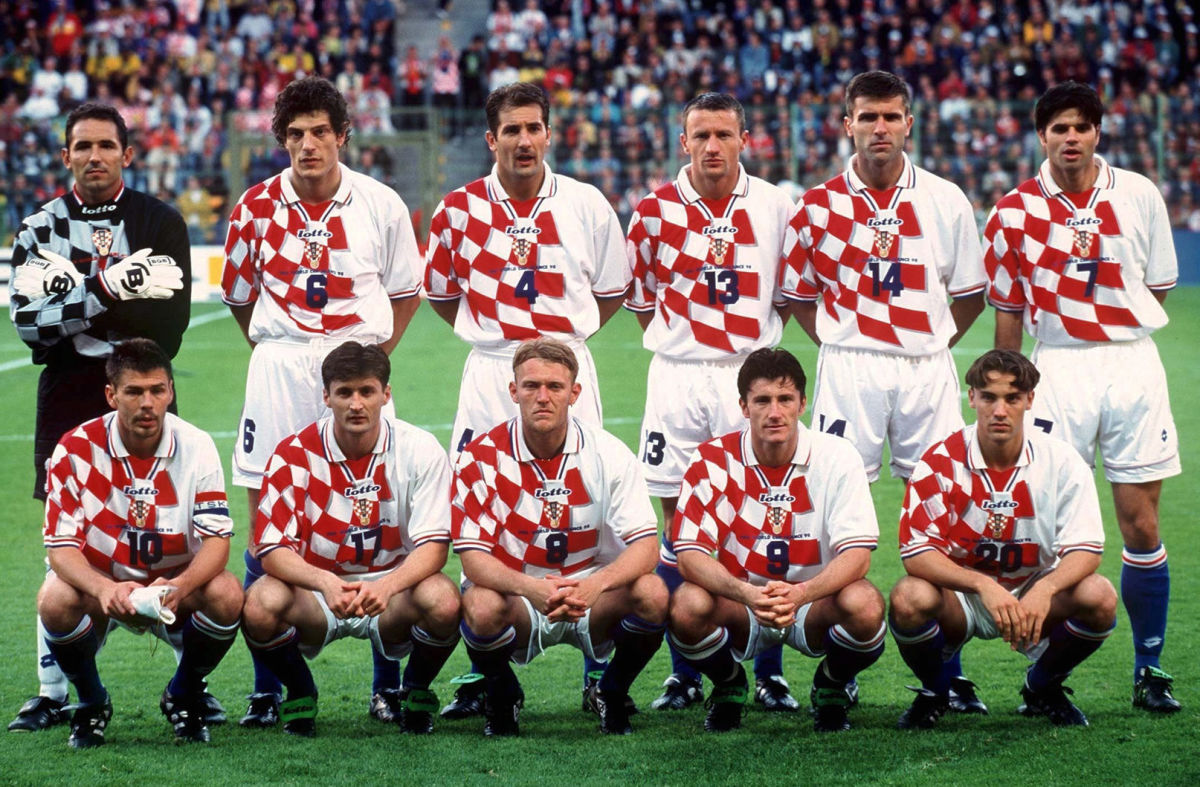World Cup Countdown: 5 Weeks to Go Croatia Win Bronze Thanks to Their Golden Boy Davor Šuker

The Yugoslavia team that travelled to the 1987 FIFA World Youth Championships was something special. There was Robert Prosinečki, named Best Young Player at the 1990 World Cup; Zvonimir Boban, a future captain of the national team; and of course there was Davor Šuker, a predatory 19-year-old forward who scored six goals at the tournament.
As Boban converted the winning spot-kick in the final against West Germany, one sensed that this was a group of players who could stick around for years to come. This could be the team that made the 1990s the defining decade of Yugoslavian football.
Five years later, their team didn’t exist, torn apart by civil war. It was a turbulent introduction to football for the young Šuker. Since signing his first professional contract at Osijek in 1984 he had scored more with every passing season. 18 goals in 1988/89, most scored with his wand of a left foot, convinced Dinamo Zagreb to bring him to the Croatian capital that summer.
💯 days, 💯 players | Davor Suker
— FIFA World Cup (@FIFAWorldCup) March 24, 2018
The prolific forward not only led 🇭🇷️ Croatia to a maiden #WorldCup qualification, at France 1998, but also drove his team-mates on to claim third place at the tournament proper, scoring 6️⃣️goals and earning the @adidas Golden Boot award pic.twitter.com/Lv9c1aS5D8
Šuker would score 39 goals in two years at the Stadion Maksimir, also making his first appearance for the newly established Croatian national team in December 1990. As disappointing as it may have been to see such a promising Yugoslavia team ripped apart, the players felt a much more deeply-rooted connection with Croatia.
“When I used to play for Yugoslavia it meant nothing,” said Igor Štimac. “It was only sport, nothing else. Now the feeling is incomparable. We were expected to sing the Yugoslavian national anthem but we didn’t want to. Now we can think we are Croatian and we can say we are Croatian. We couldn’t do that before.”
Šuker’s first season in Zagreb was marred by an infamous match against Red Star Belgrade, which barely lasted ten minutes before being abandoned as nationalistic tensions boiled over into violence. This was just a microcosm of what was happening all over Yugoslavia, as war broke out across the nation.
📽️ VIDEO VAULT
— FIFA World Cup (@FIFAWorldCup) January 11, 2018
Suker, Prosinecki, Boban, Jarni, Bilic, Stanic...
The list goes on of memorable names to come from Croatia's historic performance at France 1998 🥉
Watch @lm19official share his memories of it igniting his own #WorldCup dreams #TBT
📺👉https://t.co/hRJQzFz1Dq pic.twitter.com/jgu64ztHlE
While Šuker was completing a move to Sevilla in 1991, his countrymen were fighting and dying in the Croatian War of Independence 2000 miles away, with the port city of Dubrovnik coming under siege.
“Imagine someone bombing Seville Cathedral. That’s what’s happened in my home,” said Šuker at his unveiling, clearly in no mood to celebrate.
91 goals in five seasons at Sevilla marked Šuker out as one of Europe’s best strikers. He was equally lethal on the international scene, scoring 12 in qualifying for Euro 1996 as the remnants of the 1987 Yugoslavia team started to rebuild their legacy. Just three years after they were granted a UEFA license, Croatia were off to their first major tournament.
Sporting a distinctive red-and-white checked shirt and full of continental flair, they quickly became local favourites in England. They narrowly beat Turkey in their first match before Šuker announced himself to the English public with a brace against Denmark, including that delightful chip over Peter Schmeichel that is still considered one of the great European Championship goals.

Croatia lost 2-1 to Germany in the quarter finals but Šuker scored again and his performances for club and country were enough to make a childhood dream come true as Real Madrid brought him to the Santiago Bernabeu. He fitted in immediately, scoring a career-high 29 goals in his debut season for Los Blancos, which ended with the first trophy of his career as Real won La Liga.
The Champions League followed in 1998, meaning that Šuker headed into that summer's World Cup with sky high confidence. History has furnished Croatia with the title of underdogs, but they were more like dark horses – unlikely to win the tournament, but likely to challenge in every game and humble a few reputations along the way.
This was a group of players whose lives had been defined by war. Slaven Bilić was never selected for Yugoslavia because his father was a Croatian separatist. Aljoša Asanović’s two best friends had died in the War of Independence. Peter Krpan fought on the front lines, rifle in hand. Now football, and the World Cup, was giving them the chance to re-define themselves in a different light.
1998 @FIFAWorldCup quarter final against the great Davor #Suker 👊 #Throwback #Germany pic.twitter.com/AhEHewUhzl
— Lothar Matthäus (@LMatthaeus10) August 30, 2017
Šuker didn’t take long to get into his stride. A deflected strike against Jamaica sealed a 3-1 win for Croatia in their opening game of the tournament before a low finish crept in against Japan to send them through to the knockout stages with a game to spare. Defeat to Argentina proved to be a blessing – it meant that they faced Romania instead of England in the last 16.
Šuker’s retaken first half penalty was enough to send Croatia through to the quarters where they met Germany. The Germans were always among the favourites, but this was a side on the wane, two years away from the Euro 2000 humiliation that instigated a radical overhaul of their entire footballing identity. They were meeting a Croatia team at the peak of their powers.
Christian Wörns’ first half dismissal was punished by identical strikes from Robert Jarni and Goran Vlaović, before some Šuker trickery put the icing on the cake. He lifted the ball over Ulf Kirsten’s head, evaded the challenge of Jörg Heinrich, and then slotted the ball through Andreas Köpke’s legs. It was a moment of imperious class and a fitting way to send Croatia into the semis.
Croatia celebrate winning the bronze medal at the 1998 World Cup in France. pic.twitter.com/2nXJbx9qgo
— 90s Football (@90sfootball) October 23, 2014
Hosts France stood between them and the final, but Les Bleus had been unconvincing thus far, needing a golden goal and penalties to get to this stage. When Šuker raced onto Asanović’s lofted pass and beat Fabien Barthez, it looked like the dream was on.
Only the most unlikely hero denied them. Lilian Thuram capitalised on slack defending by Boban to level before bending in the winner past Dražen Ladić. Despite Laurent Blanc’s red card, France held on to reach their own World Cup final and Croatia had to settle for the third place play off against the Netherlands.
Šuker’s winning goal against the Dutch won him the Golden Boot and Croatia the bronze medal. With Prosinečki scoring the other goal, Boban nullifying the Dutch midfield, and Štimac defending Croatia’s lead in the second half, the class of 1987 had delivered on their promised potential.
Šuker’s career fizzled out after that, and in 2003 he hung up his boots to pursue a controversial career in politics. By contrast, Croatia were the antithesis of politics. Like the phoenix rising from the flames of Yugoslavia, they gave the rest of the world something else to remember them by.
